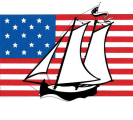What was impressment?
One of the major American complaints leading up to the War of 1812 was that the British, desperate for sailors to man their ships, were kidnapping American citizens on the high seas and forcing them to serve in the Royal Navy.
While this was certainly happening, it is more complicated than that.
At the time, most countries considered “citizenship” to be determined by the country in which you were you were born, and to be unchangeable. If you were born anywhere in the territories of Great Britain, you were a subject of King George, and as far as King George was concerned, you would always remain his subject — even if you emigrated to the US, lived there for years, became a “naturalized” citizen, and/or were employed on American ships. Seagoing subjects of the King of Great Britain had always been obligated to serve in his Navy whenever needed. And they were especially needed during the long struggle against Revolutionary and later Napoleonic France.

With roughly a thousand ships in commission, the Royal Navy had to resort to extreme measures to find sailors. It became common for British warships at sea to stop foreign vessels and examine their crews, looking for seamen who could be claimed as British subjects. Many British subjects were indeed avoiding military service, and earning higher wages, by working on American vessels. These sailors were the first to be seized. At that time, it was difficult to tell American from British sailors, and anyone with an Irish accent, especially, was likely to be taken. Many naturalized Americans, and even some native-born Americans, were removed from their ships, which enraged their friends and relatives as well as the US government.
Sailors took to carrying citizenship papers, but such papers soon became widely forged, and so the papers eventually were disregarded by British boarding parties.
Complaints and appeals occasionally led to the release of these sailors, but that process took time.
Nobody knows exactly how many men were impressed. Or how many of those were foreigners, how many were naturalized Americans, and how many were native-born Americans. But then as now, there were two major parties in American politics, and the Republicans — who were generally friendly toward France and hostile to Britain — exaggerated the number of impressments. The opposing Federalist Party downplayed them. The debate about how serious a problem impressment was, and what if anything should be done about it, went on for decades.
And we still don’t know what the numbers were.
Want to see more posts like this one? Check out our Facebook page: https://www.facebook.com/schooner.fame and Instagram account “SchoonerFame”!
